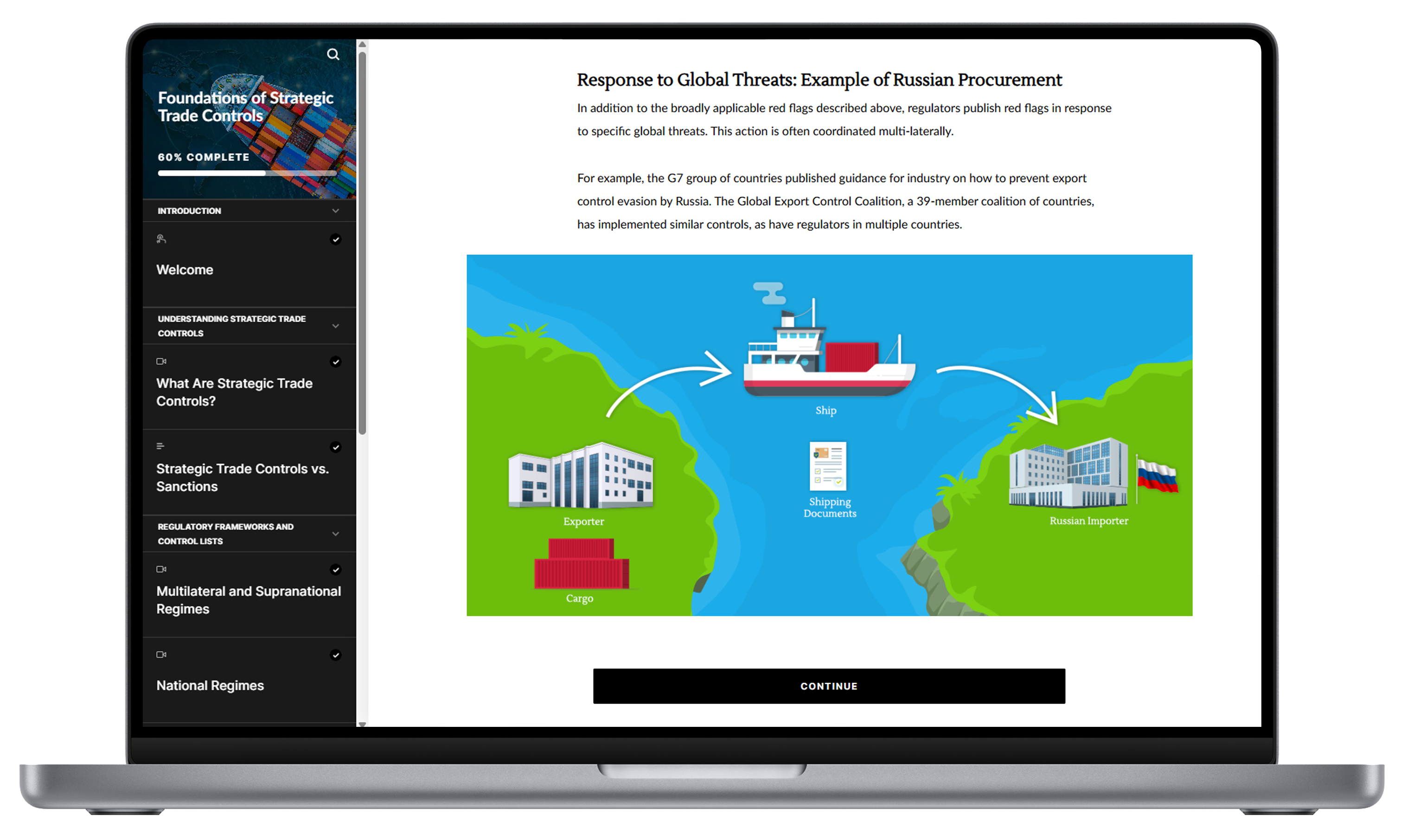Export Controls, Ethics & Human Rights in Global Trade
Navigating Strategic Trade Controls and Corporate Responsibilities in an Interconnected World
📅 April 1, 2025
📅 April 1, 2025
In an increasingly interconnected world, international trade plays a crucial role in driving economic growth and shaping global relations. However, the export of goods and technologies is fraught with ethical and legal complexities, particularly concerning human rights. Strategic trade controls are regulatory measures implemented by governments to safeguard national security, prevent proliferation, and advance foreign policy objectives. These controls typically include restrictions and licensing requirements on sensitive items. Governments and businesses have been faced with ethical dilemmas due to the intricate landscape of strategic trade controls.
Dual-use goods are items that can have both civilian and military applications. These items may include chemicals, industrial equipment, electronics and technology, or even biological materials.
For example, Amnesty International reported on several occasions in which surveillance tools, an example of dual-use goods, were sold to numerous repressive regimes globally and used in violation of international human rights. On one occasion, the Colombian Army used a platform sold by Mollitiam, a Spanish company, to spy on senior judges, politicians, and journalists in Colombia.
Controls on dual-use items are intended to stop the spread of goods or technologies that could be misused for military purposes or have other national security implications. These items create both policy and commercial challenges, as policymakers must craft regulations that prevent misuse without stifling legitimate commercial activities.
There has been heightened scrutiny of strategic trade controls in relation to human rights in recent years. Governments and international organizations are increasingly scrutinizing exports that could facilitate human rights violations. A notable example is the controversy surrounding the export of surveillance technologies to authoritarian regimes. Originally developed for legitimate purposes like crime prevention or counterterrorism, these technologies are now being misused to monitor and suppress political dissidents and minority groups. This presents a significant ethical dilemma, balancing economic interests with the potential for human rights abuses facilitated by advanced technologies.
For example, the use of facial recognition technology in Xinjiang, China, has enabled mass surveillance of the Uyghur population, undermining privacy and civil liberties. Recent revelations indicate that China has implemented an extensive, covert system of facial recognition technology specifically targeting Uyghurs, a predominantly Muslim minority. This marks the first known instance of a government using AI for racial profiling, as the technology tracks Uyghurs through surveillance networks, records their movements, and alerts authorities when their presence exceeds expected norms. Despite imperfections in accuracy, this technology represents a significant advancement in state surveillance and raises concerns about automated discrimination based on ethnicity.
The EU Non-Proliferation and Disarmament Consortium, a network of foreign policy institutions and research centers discussing political and security-related issues, reported on the Syrian regime’s misuse of common biological and chemical substances to produce chemical weapons that targeted civilians during anti-government uprisings in 2013. These common chemicals that are generally used for peaceful purposes, such as for medication or agriculture, were not subject to strategic trade controls, highlighting the complexities related to dual-use goods. Implementing strict trade controls can help prevent these items from being used to suppress dissent and violate privacy rights, thereby promoting ethical standards in global technology trade and safeguarding against their misuse.
However, implementing strategic trade controls on goods and resources that are otherwise used for development and other peaceful activities is challenging and requires a nuanced approach that integrates security considerations with practical trade and technological needs.
The international community plays a crucial role in shaping export control policies that address human rights concerns. The United Nations has established guidelines on business and human rights in order to prevent entities from doing business with countries with human rights violations.
The European Union has established guidelines and embargoes targeting countries or entities that have human rights violations. Regulation (EU) 2019/125 of the European Parliament and of the Council of 16 January 2019 “concerning trade in certain goods which could be used for capital punishment, torture or other cruel, inhuman or degrading treatment or punishment” is an EU-level trade control regulation focusing on goods that may be used for torture or capital punishment.
U.S. initiatives include a code of conduct to take human rights into account when reviewing exports that may be misused or abuse human rights. These measures aim to restrict the export of goods and technologies that could exacerbate repression or conflict. Strategic trade controls are just one measure that can be taken to influence actions. For example, the Uyghur Forced Labor Prevention Act (UFLPA) entity list, managed by the U.S. Department of Homeland Security, provides a database that highlights businesses and groups linked to forced labor, especially those associated with the Xinjiang region in China, to limit their entry into U.S. markets and uphold human rights regulations.
Businesses are increasingly expected to conduct rigorous due diligence to assess the human rights impacts of their exports. Corporate social responsibility frameworks now include provisions for ethical supply chains and responsible export practices. Companies are required to conduct comprehensive risk assessments, engage in dialogue with stakeholders, and implement safeguards to prevent their products from being misused.
While strategic trade controls are crucial for national security and advancing foreign policy objectives, they also now include human rights considerations. Strategic trade controls risks underscore the importance of robust legislation and responsible corporate behavior in ensuring that exports do not contribute to human rights abuses.
Cooperative efforts among governments, businesses, and global entities are essential in addressing the ethical challenges posed by international trade. It is through careful navigation and foresight that stakeholders can strive to ensure that economic interests do not compromise human rights.

Our course Foundations of Strategic Trade Controls offers a comprehensive overview of how to understand and apply strategic trade control requirements, with a particular focus on those applicable to financial institutions.
Learn more and strengthen your compliance skills today.










 Syndicates of Terror
Syndicates of TerrorThis site uses cookies. By continuing to browse the site, you are agreeing to our use of cookies.
Accept settingsHide notification onlySettingsWe may request cookies to be set on your device. We use cookies to let us know when you visit our websites, how you interact with us, to enrich your user experience, and to customize your relationship with our website.
Click on the different category headings to find out more. You can also change some of your preferences. Note that blocking some types of cookies may impact your experience on our websites and the services we are able to offer.
These cookies are strictly necessary to provide you with services available through our website and to use some of its features.
Because these cookies are strictly necessary to deliver the website, refusing them will have impact how our site functions. You always can block or delete cookies by changing your browser settings and force blocking all cookies on this website. But this will always prompt you to accept/refuse cookies when revisiting our site.
We fully respect if you want to refuse cookies but to avoid asking you again and again kindly allow us to store a cookie for that. You are free to opt out any time or opt in for other cookies to get a better experience. If you refuse cookies we will remove all set cookies in our domain.
We provide you with a list of stored cookies on your computer in our domain so you can check what we stored. Due to security reasons we are not able to show or modify cookies from other domains. You can check these in your browser security settings.
These cookies collect information that is used either in aggregate form to help us understand how our website is being used or how effective our marketing campaigns are, or to help us customize our website and application for you in order to enhance your experience.
If you do not want that we track your visit to our site you can disable tracking in your browser here:
We also use different external services like Google Webfonts, Google Maps, and external Video providers. Since these providers may collect personal data like your IP address we allow you to block them here. Please be aware that this might heavily reduce the functionality and appearance of our site. Changes will take effect once you reload the page.
Google Webfont Settings:
Google Map Settings:
Google reCaptcha Settings:
Vimeo and Youtube video embeds:
You can read about our cookies and privacy settings in detail on our Privacy Policy Page.
Privacy Policy